History | 16.11.2009
The introduction of the euro - January 1, 2002
But the skepticism was enormous. Many people were afraid that the stable Deutschmark would be replaced with a currency that would usher in an era of high inflation rates. Others were concerned about the influence of those national economies that produced less than Germany. What influence would their inflation rates have on the stability of the common currency?
Starter kits
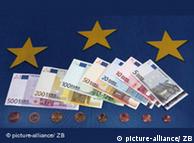 Bildunterschrift: Großansicht des Bildes mit der Bildunterschrift: How stable would the new currency be? Many feared inflation
Bildunterschrift: Großansicht des Bildes mit der Bildunterschrift: How stable would the new currency be? Many feared inflation
The euro was made available at the stroke of midnight on December 31, 2001, but the run-up period was lengthy. The retail sector and banks had been using the new currency since September. Prices had to be listed in both currencies so that people could start to develop a sense of the euro's value. In Germany, the rule of thumb was: two D-marks equal one euro.
Posters and campaigns helped spread the word about the coming currency conversion, and on December 17, 2001, starter kits went on sale at bank counters. For 20 D-marks, you could buy just over 10 euros in coins. But you couldn't use them yet to pay for anything - that only began on January 1, 2002.
Historic dimensions
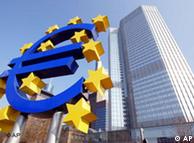 Bildunterschrift: Großansicht des Bildes mit der Bildunterschrift: The euro sculpture outside the ECB
Bildunterschrift: Großansicht des Bildes mit der Bildunterschrift: The euro sculpture outside the ECB
The introduction of the euro was the subject of many lengthy debates held by politicians throughout the EU member states. A dedicated European, German Chancellor Helmut Kohl had already voted in favor of the common currency during the negotiations over the Maastricht Treaty in February of 1992. His agreement carried enormous weight, as evidenced by the fact that many countries made their approval of German reunification dependent on Germany remaining firmly anchored in the western community of values. A common European currency seemed to the participating heads of state the best means of ensuring that this decision would be irreversible.
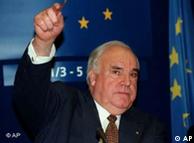 Bildunterschrift: Großansicht des Bildes mit der Bildunterschrift: A dedicated European: Helmut Kohl
Bildunterschrift: Großansicht des Bildes mit der Bildunterschrift: A dedicated European: Helmut Kohl
During Germany's parliamentary debate about the introduction of the euro, Chancellor Kohl highlighted the decision's historic dimensions. "The realization of the European economic and currency union is, in its consequences, the most significant decision since German reunification. It is the most deeply reaching change on our European continent since the collapse of Communism."
It was not the first time that a common currency had been introduced on the continent. Around 1,150 years before, Frankish King Charlemagne (747 - 814) had had the same idea. Everyone everywhere was able to pay for goods with the silver denier. It made it possible to compare prices and to find out what price your services had in another place. Then as now, people on the continent profited from the ability to carry out transactions anywhere without having to change money. But it was an advantage that vanished again with the division of Franconia at the end of the ninth century.
Stable currency
The original skepticism about the euro has disappeared. Seven years after its introduction, the euro is one of the most stable currencies in the world. Many countries hold their currency reserves in euros, which have been gaining more and more in value against the US dollar. That's mainly due to a common European Central Bank, of which Germany was a vocal advocate. Common fiscal policy is - in part due to historical reasons - aimed at keeping inflation low. The alarming inflation rates seen in Europe in the past are still firmly embedded in the collective conscience, and are even capable of provoking fear and worry among those who didn't personally experience such times.
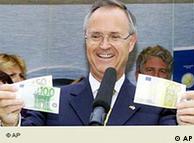 Bildunterschrift: Großansicht des Bildes mit der Bildunterschrift: Hans Eichel oversaw the introduction of the euro in Germany
Bildunterschrift: Großansicht des Bildes mit der Bildunterschrift: Hans Eichel oversaw the introduction of the euro in Germany
The euro has passed its initial tests, and it now plays a respected role in the global financial system. The eurozone has also helped secure peace on the continent. Waging war against one's own currency makes just as little sense as a company that would destroy its own factories. Former German Finance Minister Hans Eichel (1941) summed up the significance of the day of the introduction of the euro as follows: "This is a historic day because European unity has become a tangible reality for every person. For us Europeans, this is a great project for prosperity and peace in the 21st century."
Author: Matthias von Hellfeld (dc)
Editor: Andreas Illmer-------------ANTIGRAFIKON DROM DW
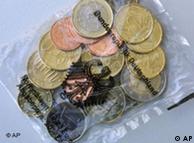

No comments:
Post a Comment